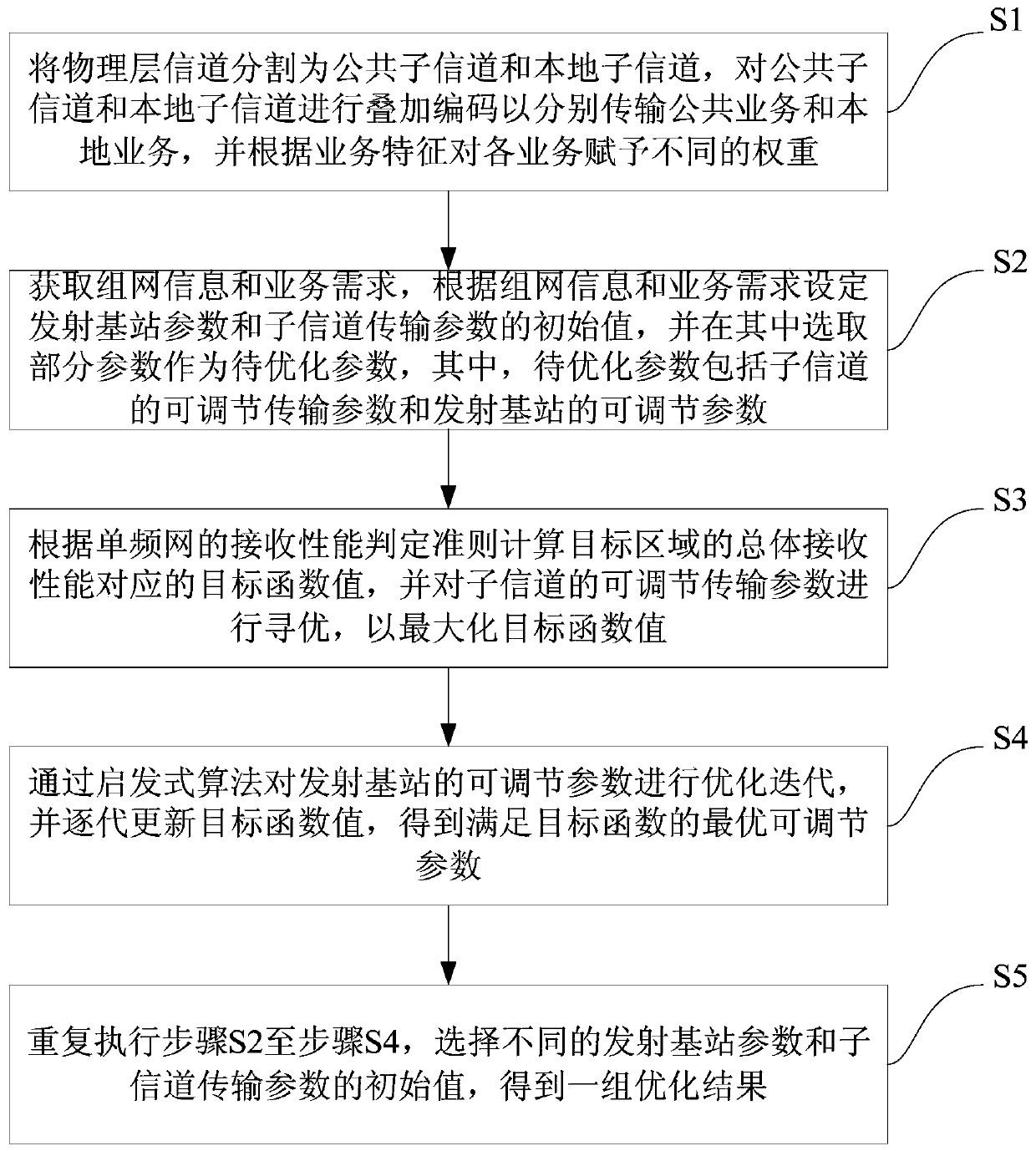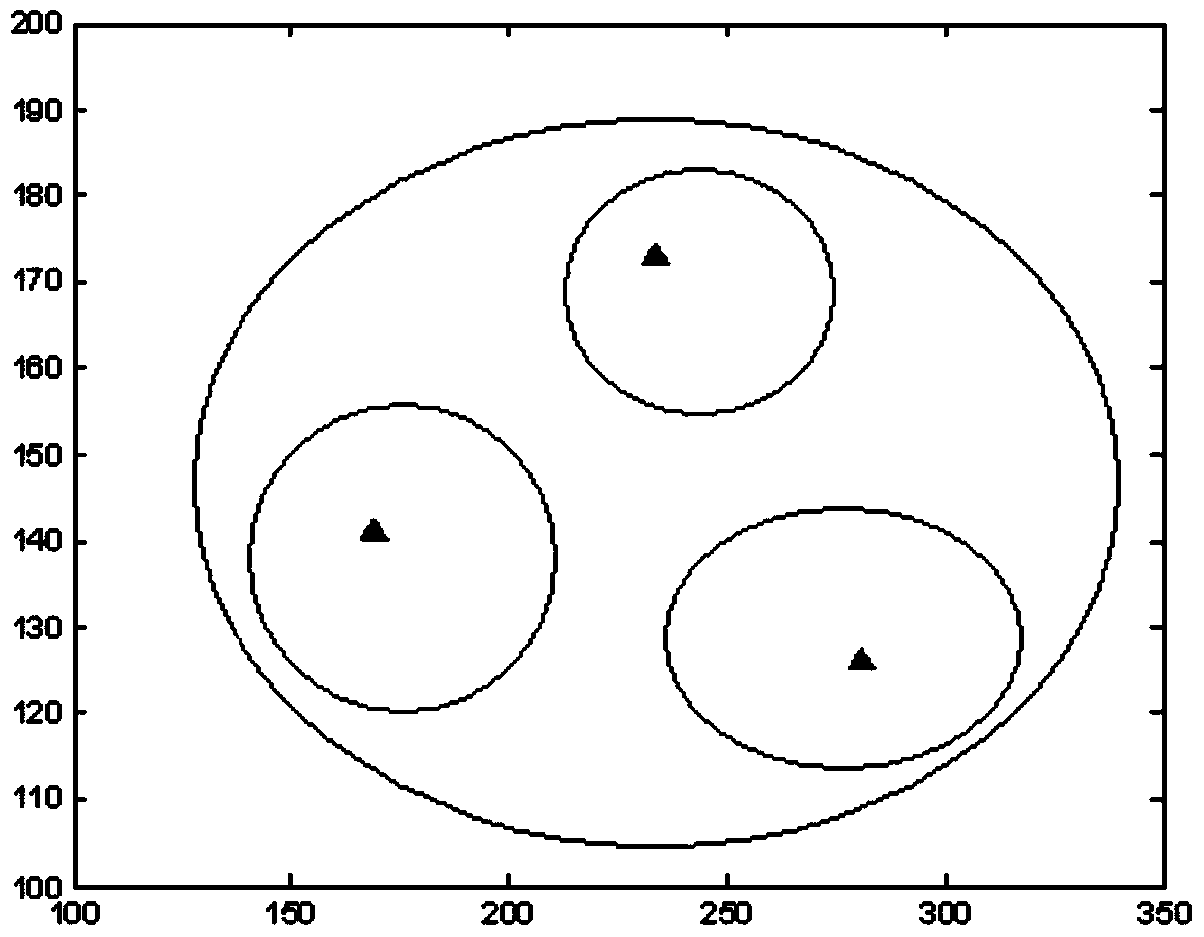Optimization method for multi-service broadcast single frequency network based on superposition coding
A broadcast single frequency network and superposition coding technology, which is applied in the field of multi-service broadcast single frequency network optimization based on superposition coding, can solve the problems of signal inter-symbol interference, frequency selective fading, etc., so as to make full use of channel resources and reduce design cycle. , to achieve the effect of efficient use
- Summary
- Abstract
- Description
- Claims
- Application Information
AI Technical Summary
Problems solved by technology
Method used
Image
Examples
Embodiment 1
[0054] This embodiment is aimed at a single frequency network for multi-service transmission based on direct linear superposition coding in a DTMB (Digital Television Terrestrial MultimediaBroadcasting, national standard for digital television terrestrial transmission) system, according to figure 1 The shown method of the present invention provides the implementation steps of the optimization strategy using the genetic algorithm.
[0055] The single frequency network to be optimized selected in this embodiment includes three transmitting base stations, and its layout and target areas of each service are as follows: figure 2 shown. Among them, the largest ellipse on the periphery indicates the target area of public services, and the three smaller ellipses inside the device are the target areas of local services. The location, height, antenna gain, antenna height, and polarization mode of each base station are shown in Table 1 below:
[0056]
[0057] Table 1
[0058] Th...
Embodiment 2
[0089] This embodiment is aimed at a single frequency network for multi-service transmission based on bit division multiplexing in a DTMB system, according to figure 1 The shown method of the present invention gives the implementation steps of the optimization strategy using the simulated annealing algorithm.
[0090] The parameters of the single frequency network base station to be optimized selected in this embodiment are the same as those in the first embodiment.
[0091] Then, the multi-service service quality requirements (business requirements) required by the system are:
[0092] 1) Transmission rate: public service R global = 10Mbps, local service R local1 = R local2 = R local3 =15Mbps; 2) The priority weight of each local service is the same.
[0093] In this embodiment, the method includes the following steps:
[0094] Step 10: Divide the physical layer channel into public sub-channels and local sub-channels, use superposition coding to transmit public services...
Embodiment 3
[0112] This embodiment is aimed at a single frequency network for multi-service transmission based on bit division multiplexing in a DTMB system, according to figure 1 The shown method of the present invention provides the implementation steps of the optimization strategy using the particle swarm algorithm.
[0113] The parameters of the single frequency network base station to be optimized selected in this embodiment are the same as those in the first embodiment.
[0114] Then, the multi-service service quality requirements (business requirements) required by the system are:
[0115] 1) Transmission rate: public service R global = 10Mbps, local service R local1 =R local2 = 15Mbps, R local3 =20Mbps; 2) The weight of the local service is ω 1 = ω 2 = 1, ω 3 =2.
[0116] In this embodiment, the method includes the following steps:
[0117] Step 100: Divide the physical layer channel into public sub-channels and local sub-channels, use superposition coding to transmit pub...
PUM
 Login to View More
Login to View More Abstract
Description
Claims
Application Information
 Login to View More
Login to View More - R&D
- Intellectual Property
- Life Sciences
- Materials
- Tech Scout
- Unparalleled Data Quality
- Higher Quality Content
- 60% Fewer Hallucinations
Browse by: Latest US Patents, China's latest patents, Technical Efficacy Thesaurus, Application Domain, Technology Topic, Popular Technical Reports.
© 2025 PatSnap. All rights reserved.Legal|Privacy policy|Modern Slavery Act Transparency Statement|Sitemap|About US| Contact US: help@patsnap.com



